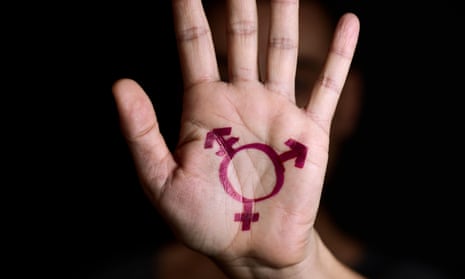Since 2004 trans people in the UK have been able to legally change their gender with a gender recognition certificate. The Gender Recognition Act became the first law in the world allowing someone to change gender without surgery. Since then countries including Ireland and Denmark have passed laws that allow people to “self-declare” their gender, rather than seeking approval from a panel of experts. Last year the Scottish government held a consultation with a view to following suit. This Friday the UK government’s consultation on the same issue comes to an end. The debate has become toxic, with trans rights activists and some feminist campaigners taking opposing sides.
The Guardian rejects the idea that one of these positions is the right one – and the other wrong. Important questions of personal identity are at stake, but also legal rights and protections. (The rights of trans men are far less controversial because they do not, while transitioning, gain access to spaces designed to protect a disadvantaged group.) While campaigners for trans rights are entitled to push for laws that they believe advance equality, feminists are entitled to question whether such changes could adversely affect other women. Neither group is a homogeneous bloc and there are more than two points of view.
UK law acknowledges circumstances where there is a conflict of interests between trans women and other women. The Equality Act allows for single-sex services to exclude trans people where this is “a proportionate means of meeting a legitimate aim”, such as in rape support services. While some trans activists have argued for these exemptions to be abolished, some feminists believe they should be strengthened. The Guardian supports trans equality and believes reform of the Gender Recognition Act could form part of this. Campaigners criticise the current process – whereby trans people must supply evidence of a medical diagnosis of gender dysphoria and of having lived in their “acquired gender” for two years – as humiliating and bureaucratic. Other countries have introduced self-declaration without obvious difficulties, though since the changes are recent it is right to be cautious. Ireland requires a statutory declaration witnessed by a lawyer; in Denmark there is a six-month pause before completion. Different countries apply the law in different ways. In Ireland, for example, transgender prisoners have been allocated according to natal sex. The UK has a far larger population than any European country with self-declaration; this nation has 20 times more people behind bars than Ireland. Any new law must not give violent or controlling male prisoners a new opportunity to dominate women by changing gender and transferring to a female prison.
Trans organisations say such fears are exaggerated and born of prejudice and hatred. Transphobia must be opposed. But misogyny too must be challenged. Gender identity does not cancel out sex. Women’s oppression by men has a physical basis, and to deny the relevance of biology when considering sexual inequality is a mistake. The struggle for women’s empowerment is ongoing. Reproductive freedoms are under threat and the #MeToo campaign faces a backlash. Women’s concerns about sharing dormitories or changing rooms with “male-bodied” people must be taken seriously. These are not just questions of safety but of dignity and fairness.
The consultation has stirred up questions that go beyond the proposed change in the law. The UK may be moving towards a situation where the default is single-gender spaces rather than single-sex spaces, with organisations such as the Girl Guides amending their practices. The implications of this shift should not be underestimated. The public needs to be better informed, and safeguarding considered. The sex-based protections in the Equality Act, like case-by-case decision-making in the Prison Service, only work if service providers have adequate guidance and training. Where changes have been introduced or are proposed, including in prisons, women should be consulted.
This is a complex issue that society needs to consider thoughtfully. Further research into the rise in referrals of children to gender identity services would be helpful, for example. Social media have unhelpfully amplified the voices at both extremes of this argument. The current divisions are troubling. The end of the consultation ought to create a pause for reflection and space for a more constructive exchange.
